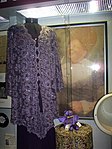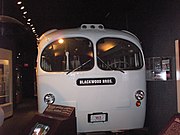| Revision as of 12:32, 4 December 2020 editCitation bot (talk | contribs)Bots5,420,544 edits Alter: url. URLs might have been internationalized/anonymized. Add: chapter-url, doi-broken-date. Removed or converted URL. Some additions/deletions were actually parameter name changes. | You can use this bot yourself. Report bugs here. | Suggested by AManWithNoPlan | All pages linked from cached copy of User:AManWithNoPlan/sandbox2 | via #UCB_webform_linked 1213/4703← Previous edit | Revision as of 16:49, 18 January 2021 edit undoCitation bot (talk | contribs)Bots5,420,544 edits Alter: doi-broken-date. | You can use this bot yourself. Report bugs here. | Suggested by AManWithNoPlan | Category:CS1 maint: DOI inactive as of December 2020 | via #UCB_Category 30/640Next edit → | ||
| Line 34: | Line 34: | ||
| ==History== | ==History== | ||
| The ] (GMA) was founded in 1964 to promote Gospel music.<ref name=":0">{{Cite web |url=https://www.oxfordmusiconline.com/grovemusic/view/10.1093/gmo/9781561592630.001.0001/omo-9781561592630-e-1002249657 |title=Gospel Music Association |last=Westover |first=Jonas |website=] |doi=10.1093/gmo/9781561592630.001.0001/omo-9781561592630-e-1002249657 |doi-broken-date= |
The ] (GMA) was founded in 1964 to promote Gospel music.<ref name=":0">{{Cite web |url=https://www.oxfordmusiconline.com/grovemusic/view/10.1093/gmo/9781561592630.001.0001/omo-9781561592630-e-1002249657 |title=Gospel Music Association |last=Westover |first=Jonas |website=] |doi=10.1093/gmo/9781561592630.001.0001/omo-9781561592630-e-1002249657 |doi-broken-date=2021-01-18 |url-status=live |access-date=April 11, 2020}}</ref> It was created as an extension of the National Quartet Convention, a convention devoted to ] that had been operating since 1956.<ref name="cusic">Cusic, Don, ed. ''Encyclopedia of Contemporary Christian Music: Pop, Rock and Worship''. ABC-CLIO, 2009, pp. 223-224.</ref> Its founding board included ], ] and ], ], ], ], and ], and its first president was ].<ref name=cusic/><ref>W.K. McNeil, ed. ''Encyclopedia of American Gospel Music''. Routledge, 2013, pp. 149-150.</ref> In its early years, it faced competition from the United States Gospel Music Association, a for-profit entity also focused on gospel music.<ref>"Editorial Notes Differences in Gospel Music Assn. and GMA". '']'', October 22, 1966. ()</ref> | ||
| In the 1970s and 1980s, tension and conflict emerged between ] and the newer developments of ] and ].<ref name=":1">Cusic, Don. 2002. p. 377-380</ref><ref name=":2">Goff, James R. 2002. p. 271-274</ref> Southern Gospel conservatives had been resistant to ], and even as they were slowly becoming more receptive to integration, the new developments in Christian music resulted in Southern Gospel becoming increasingly marginalized by music consumers and losing influence in the GMA.<ref name=":1" /><ref name=":2" /><ref name=":3">{{Cite book |last=Cheatham |first=Russ |chapter-url=https://books.google.com/books?id=HZQemZyozqwC&pg=PA252 |title=Continuum Encyclopedia of Popular Music of the World Volume 8: Genres: North America |date=March 8, 2012 |publisher=] |year=2012 |isbn=978-1-4411-6078-2 |editor-last=Hornd |editor-first=David |series=Continuum Encyclopedia of Popular Music of the World |volume=8: Genres: North America |location=New York and London |pages=252 |language=en |chapter=Gospel Music, White}}</ref> Many Southern conservatives, including members of the GMA, also disapproved of rock music and felt that the newer styles of Gospel music being promoted by the GMA indicated that the organization was essentially moving into an alliance with the "enemy".<ref>Goff, James R. 2002. p. 272</ref> The Southern Gospel industry became disenchanted with the direction that the GMA was heading and a new organization, the Southern Gospel Music Association, was formed by Charles Waller.<ref name=":4">Cusic, Don. 2002. p. 379</ref> However, in 1985, this organization was absorbed by the GMA.<ref name=":3" /><ref name=":4" /> A new, independent Southern Gospel Music Association was formed in 1995.<ref name=":3" /><ref>Cusic, Don. 2002. p. 380</ref><ref>{{Cite book |last=Goff |first=James R. |url=https://books.google.com/books?id=kJQtrJNvo7gC&pg=PA277 |title=Close Harmony: A History of Southern Gospel |date=2002 |publisher=UNC Press Books |isbn=978-0-8078-5346-7 |language=en}}</ref> | In the 1970s and 1980s, tension and conflict emerged between ] and the newer developments of ] and ].<ref name=":1">Cusic, Don. 2002. p. 377-380</ref><ref name=":2">Goff, James R. 2002. p. 271-274</ref> Southern Gospel conservatives had been resistant to ], and even as they were slowly becoming more receptive to integration, the new developments in Christian music resulted in Southern Gospel becoming increasingly marginalized by music consumers and losing influence in the GMA.<ref name=":1" /><ref name=":2" /><ref name=":3">{{Cite book |last=Cheatham |first=Russ |chapter-url=https://books.google.com/books?id=HZQemZyozqwC&pg=PA252 |title=Continuum Encyclopedia of Popular Music of the World Volume 8: Genres: North America |date=March 8, 2012 |publisher=] |year=2012 |isbn=978-1-4411-6078-2 |editor-last=Hornd |editor-first=David |series=Continuum Encyclopedia of Popular Music of the World |volume=8: Genres: North America |location=New York and London |pages=252 |language=en |chapter=Gospel Music, White}}</ref> Many Southern conservatives, including members of the GMA, also disapproved of rock music and felt that the newer styles of Gospel music being promoted by the GMA indicated that the organization was essentially moving into an alliance with the "enemy".<ref>Goff, James R. 2002. p. 272</ref> The Southern Gospel industry became disenchanted with the direction that the GMA was heading and a new organization, the Southern Gospel Music Association, was formed by Charles Waller.<ref name=":4">Cusic, Don. 2002. p. 379</ref> However, in 1985, this organization was absorbed by the GMA.<ref name=":3" /><ref name=":4" /> A new, independent Southern Gospel Music Association was formed in 1995.<ref name=":3" /><ref>Cusic, Don. 2002. p. 380</ref><ref>{{Cite book |last=Goff |first=James R. |url=https://books.google.com/books?id=kJQtrJNvo7gC&pg=PA277 |title=Close Harmony: A History of Southern Gospel |date=2002 |publisher=UNC Press Books |isbn=978-0-8078-5346-7 |language=en}}</ref> | ||
Revision as of 16:49, 18 January 2021
| Company type | Private |
|---|---|
| Industry | Southern gospel music |
| Genre | Christian |
| Founder | Glen Payne J.D.Sumner James Blackwood |
| Headquarters | Pigeon Forge, Tennessee, United States |
| Key people | Raymond Brooks Eric Blackwood David Sutton Eric Bennett Lisa Fuller Ron Blackwood jr Daniel Justice Martina Blackwood |
| Owner | Southern Gospel Media |
| Parent | Southern Gospel Media |
| Website | sgma.org |
The Southern Gospel Music Association (SGMA) is a non-profit corporation formed as an association of southern gospel music singers, songwriters, fans, and industry workers. Membership is acquired and maintained through payment of annual dues. The SGMA was formed in 1994, and states that its primary goal is "to preserve, protect and promote Southern Gospel Music, its history and heritage".
The Southern Gospel Music Association operates the Southern Gospel Museum and Hall of Fame in Pigeon Forge, a popular Tennessee tourist town, and also hosts the Southern Gospel Music Awards. The Hall of Fame and Museum was opened at the Dollywood theme park in 1999.
Leadership of the SGMA is vested in a 23-member board of directors. The SGMA is responsible for the nomination, selection, and induction into the Southern Gospel Music Hall of Fame.
History
The Gospel Music Association (GMA) was founded in 1964 to promote Gospel music. It was created as an extension of the National Quartet Convention, a convention devoted to Southern gospel that had been operating since 1956. Its founding board included Don Butler, Cecil and James Blackwood, Vestal Goodman, Charlie Lamb, Don Light, and J.D. Sumner, and its first president was Tennessee Ernie Ford. In its early years, it faced competition from the United States Gospel Music Association, a for-profit entity also focused on gospel music.
In the 1970s and 1980s, tension and conflict emerged between Southern gospel and the newer developments of Jesus music and Contemporary Christian music. Southern Gospel conservatives had been resistant to racial integration, and even as they were slowly becoming more receptive to integration, the new developments in Christian music resulted in Southern Gospel becoming increasingly marginalized by music consumers and losing influence in the GMA. Many Southern conservatives, including members of the GMA, also disapproved of rock music and felt that the newer styles of Gospel music being promoted by the GMA indicated that the organization was essentially moving into an alliance with the "enemy". The Southern Gospel industry became disenchanted with the direction that the GMA was heading and a new organization, the Southern Gospel Music Association, was formed by Charles Waller. However, in 1985, this organization was absorbed by the GMA. A new, independent Southern Gospel Music Association was formed in 1995.
Southern Gospel Museum and Hall of Fame


The Southern Gospel Museum and Hall of Fame is a site operated at Dollywood, in Pigeon Forge, Tennessee, by the Southern Gospel Music Association. It was established in 1997. The Hall of Fame is composed of pioneers in the field of Southern gospel music; members are selected by the SGMA annually, and are honored by a descriptive plaque and portrait in the Hall itself. The Museum contains thousands of items of memorabilia and a gift shop. An animatronic quartet, sponsored by Bill Gaither, sings "Give the World a Smile." Other interesting items on display include a replica of the Blackwood Brothers first bus, interactive video and sound clips, and bronze plaques of Hall of Fame inductees. It has been estimated that over one million people visit the facility annually.
Beginning in 2004, the Hall of Fame began holding their popular annual induction ceremonies. Dollywood closes its doors to the public, and the all-day event is filled with musical performances.
The Hall of Fame is currently under the leadership of Executive Director Charles Waller, who is also producer of the Grand Ole Gospel Reunion in Knoxville, Tennessee.
Inductees
- A-L
|
|
|
|
- M-Z
|
|
|
|
| This article is a part in a series on |
| Gospel music |
|---|
 |
| Roots and beginnings |
| Genres and subgenres |
| Related music genres |
| Associations and groups |
| Awards |
|
See also: |
James D. Vaughan Impact Award recipients
- 1999 Bill Gaither
- 2000 The Cathedrals
- 2001 James Blackwood
- 2002 J. G. Whitfield
- 2003 Les Beasley
- 2004 Paul Heil
- 2005 Mosie Lister
- 2006 Bob Brumley
- 2007 Eva Mae LeFevre
- 2008 Lari Goss
- 2009 Barbara Mandrell
- 2010 Dolly Parton
- 2011 The Statler Brothers
- 2012 The Oak Ridge Boys
- 2013 Louise Mandrell
Gallery
-
 Dress belonging to the late Vestal Goodman of the Happy Goodman Family
Dress belonging to the late Vestal Goodman of the Happy Goodman Family
-
 Suit belonging to the late Wendy Bagwell of Wendy Bagwell and the Sunliters
Suit belonging to the late Wendy Bagwell of Wendy Bagwell and the Sunliters
-
 Dress belonging to Dottie Rambo
Dress belonging to Dottie Rambo
-
 Suit belonging to the late Howard Goodman of the Happy Goodman Family
Suit belonging to the late Howard Goodman of the Happy Goodman Family
-
 Replica of Blackwood Brothers original bus
Replica of Blackwood Brothers original bus
See also
References
- Westover, Jonas. "Gospel Music Association". Grove Music Online. doi:10.1093/gmo/9781561592630.001.0001/omo-9781561592630-e-1002249657 (inactive 2021-01-18). Retrieved April 11, 2020.
{{cite web}}: CS1 maint: DOI inactive as of January 2021 (link) CS1 maint: url-status (link) - ^ Cusic, Don, ed. Encyclopedia of Contemporary Christian Music: Pop, Rock and Worship. ABC-CLIO, 2009, pp. 223-224.
- W.K. McNeil, ed. Encyclopedia of American Gospel Music. Routledge, 2013, pp. 149-150.
- "Editorial Notes Differences in Gospel Music Assn. and GMA". Billboard, October 22, 1966. (Google Books)
- ^ Cusic, Don. 2002. p. 377-380
- ^ Goff, James R. 2002. p. 271-274
- ^ Cheatham, Russ (March 8, 2012). "Gospel Music, White". In Hornd, David (ed.). Continuum Encyclopedia of Popular Music of the World Volume 8: Genres: North America. Continuum Encyclopedia of Popular Music of the World. Vol. 8: Genres: North America. New York and London: A&C Black. p. 252. ISBN 978-1-4411-6078-2.
{{cite book}}: CS1 maint: date and year (link) - Goff, James R. 2002. p. 272
- ^ Cusic, Don. 2002. p. 379
- Cusic, Don. 2002. p. 380
- Goff, James R. (2002). Close Harmony: A History of Southern Gospel. UNC Press Books. ISBN 978-0-8078-5346-7.
External links
This Southern Gospel-related article is a stub. You can help Misplaced Pages by expanding it. |